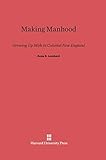Making Manhood : Growing Up Male in Colonial New England / Anne S. Lombard.
Material type: TextPublisher: Cambridge, MA : Harvard University Press, [2013]Copyright date: ©2003Edition: Reprint 2014Description: 1 online resource (244 p.)Content type:
TextPublisher: Cambridge, MA : Harvard University Press, [2013]Copyright date: ©2003Edition: Reprint 2014Description: 1 online resource (244 p.)Content type: - 9780674418141
- 9780674418158
- Jeugd
- Jongens
- Masculinity
- Männlichkeit
- Männlichkeit
- Sekseverschillen
- Sex role
- Soziale Situation
- Sozialwissenschaften, Soziologie, Anthropologie
- Volwassenwording
- man Wort
- HISTORY / United States / State & Local / New England (CT, MA, ME, NH, RI, VT)
- New England -- History -- Colonial period, approximately 1600-1775
- SOCIAL SCIENCE / Gender Studies
- SOCIAL SCIENCE / General
- SOCIAL SCIENCE / Men's Studies
- HISTORY / United States / Colonial Period (1600-1775)
- 305.31/0974
- HQ1090.5.N36
- online - DeGruyter
| Item type | Current library | Call number | URL | Status | Notes | Barcode | |
|---|---|---|---|---|---|---|---|
 eBook
eBook
|
Biblioteca "Angelicum" Pont. Univ. S.Tommaso d'Aquino Nuvola online | online - DeGruyter (Browse shelf(Opens below)) | Online access | Not for loan (Accesso limitato) | Accesso per gli utenti autorizzati / Access for authorized users | (dgr)9780674418158 |
Browsing Biblioteca "Angelicum" Pont. Univ. S.Tommaso d'Aquino shelves, Shelving location: Nuvola online Close shelf browser (Hides shelf browser)

|

|

|

|

|

|

|
||
| online - DeGruyter The Politics of Railroad Coordination, 1933–1936 / | online - DeGruyter Barbarolexis : Medieval Writing and Sexuality / | online - DeGruyter J. J. Rousseau: An Afterlife of Words / | online - DeGruyter Making Manhood : Growing Up Male in Colonial New England / | online - DeGruyter Signs of Sense : Reading Wittgenstein’s ‹i›Tractatus‹/i› / | online - DeGruyter Communities of Honor and Love in Henry James / | online - DeGruyter Germany and the United States : A "Special Relationship" / |
Frontmatter -- Contents -- Preface -- Introduction: The Ideal of Rational Manhood -- 1 Fathers and Sons from Infancy through Boyhood -- 2 Youth and the Passions: Friendship and Love before 1700 -- 3 Youth and the Challenge of the Eighteenth Century -- 4 Manhood and Marriage -- 5 Manliness and the Use of Force -- 6 Manhood and Politics -- Epilogue: Intimate Relationships and Autonomous Manhood in the Nineteenth Century -- Notes -- Index
restricted access online access with authorization star
http://purl.org/coar/access_right/c_16ec
Countering our image of early Anglo-American families as dominated by harsh, austere patriarchs, Anne Lombard challenges long-held assumptions about the history of family life by casting a fresh look at the experience of growing up male in seventeenth- and eighteenth-century New England. Drawing upon sources ranging from men's personal writings to court records to medical literature, Lombard finds that New England's Puritan settlers and their descendants shared a distinctive ideal of manhood that decisively shaped the lives of boys and men. At its core was a suspicion of emotional attachments between men and women. Boys were taken under their father's wing from a young age and taught the virtues of reason, responsibility, and maturity. Intimate bonds with mothers were discouraged, as were individual expression, pride, and play. The mature man who moderated his passions and contributed to his family and community was admired, in sharp contrast to the young, adventurous, and aggressive hero who would emerge after the American Revolution and embody our modern image of masculinity. Lombard writes with empathy and sensitivity of colonial life and the ways in which it interacted not only with male experience but also with the larger political history of eighteenth-century America.
Mode of access: Internet via World Wide Web.
In English.
Description based on online resource; title from PDF title page (publisher's Web site, viewed 29. Nov 2021)


